I see the Byzantines of Nikolaios' era will continue relying on mercenaries. Quite sensible, all in all, if the Empire makes a lot of money.

Rome AARisen - a Byzantine AAR
- Thread starter General_BT
- Start date
-
We have updated our Community Code of Conduct. Please read through the new rules for the forum that are an integral part of Paradox Interactive’s User Agreement.
You are using an out of date browser. It may not display this or other websites correctly.
You should upgrade or use an alternative browser.
You should upgrade or use an alternative browser.
Me too.canonized said:Nice little bonus update there ! Makes me want to play Medieval Total War again for some reason XD .
The Byzantines where my absolute favorite faction in MTW. Hold the line with Byzantine Infantry, weaken the enemy with Trapenzunt Archers and hammer their flanks with Varaguians and Kataphracts. Ah those where the days.
Anyway a very interesting update. I hope one on the native Roman units will follow. But please, please only after you have revealed what happened to Demetrios and Michael.
~Lord Valentine~
I find the insistence that Norman mercenaries should only be used as a last resort rather puzzling. For all their discipline problems, the Normans basically won the battle of Mt. Tabor for the Byzantines, didn’t they?
Fulcrumvale said:I find the insistence that Norman mercenaries should only be used as a last resort rather puzzling. For all their discipline problems, the Normans basically won the battle of Mt. Tabor for the Byzantines, didn’t they?
Maybe it's to prevent it getting to their head. They're an ambitious lot, the Normans.
Great excert from the Emperor. Reminds me of the manual for governing that Constantine Porphyrogenitus wrote for his son.
First some replies:
VILenin - Yes, that's where I got the inspiration for doing this little mini-update series. Byzantine Emperors often had a remarkable amount of free time - most held court basically from morning until only three or four in the afternoon, after which they were free to pursue their own interests. Some, like Constantine Porphyrogenitus, took to writing, others engaged freely and gleefully in theological debates, some gardened, some played polo, some trained with the army. I didn't think that someone regarded as a great general like Demetrios would go without writing something along these lines - or have someone ghost write it and slap his name on it to lend credibility.
Fulcrumvale - Yes, the Normans are devastatingly effective in battle, but at a series of huge downsides. They cause destruction to the lands around them through pillage, they do not respect the Byzantine throne or the Orthodox Church, and above all, they are ambitious. The author of the Strategikon views these downsides as outweighing whatever advantage can be gained by having them on the field.
RGB - The Byzantines have always been my favorite faction in both Medieval Total Wars, though with the new one I've had to get some mods and patches to change some of the most glaring things...
Estonianzulu - Yes, things are suddenly looking down for our heroes. Who lives and dies, who survives and thrives... well, I'll have the answers to that next week.
canonized - Glad you liked it. I'm doing these as a mini-series covering the army of Demetrios while I write and rewrite the next part of the story. Hope you like the rest!
=============================== ==========================

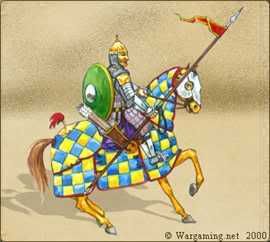
Hetaratoi
The Heteratoi form the Emperor's last line of defense, his shield when the sword of his army is broken. As such they should be the most carefully watched and maintained unit in all of Romanion. They also should never become too large - one thousand is a good number. Membership in the Hetaratoi is prestigious and should only go to the best, brightest, and bravest of the nobility as a training ground for both their skills in combat and their loyalty to the crown. As they are considered an elite unit, the Hetaratoi should always look the part - glazed armor and colorful cloaks and padded armor for their steeds should be in order. Ornate but useful masks as well. All of these reinforce the uniqueness of the unit to each member, making them proud to fight within it, and all the more resilient on the battlefield.
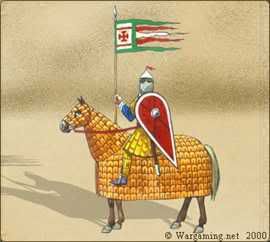
Klibanophroi
The Klibanophroi are the heaviest of the regular cavalry units, with both rider and mount covered in either chain or padded armor. A good klibanophroi will be equipped with a lance, mace, large kite shield, and the panoply of armor. As this equipment is expensive, all klibanophroi units should be raised by the state purse, and similarly maintained. The state should endeavor to keep as many of these units in the field as possible, as their charge is unstoppable by any known force. - Translator's Note - this is often used as evidence by many that the Strategikon was indeed written by Demetrios Megos, who was fond of heavy cavalry despite its slow speed
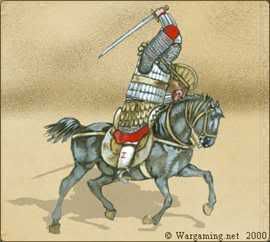
Kataphraktoi
Kataphraktoi has come to mean any of the cavalry units in Imperial service that wear heavy armor over the rider, if not the horse. These bear more in common with the Latin milites than with the kataphraktoi of old, whose tradition is best represented by the klibanophroi. These units are lighter and faster than the klibanophroi, but lack the heavier unit's ability to shatter formed infantry in a charge due to the lack of protection for the horse. Use them to batter and break up other cavalry formations, or as a heavy force to crush already wavering enemy infantry units. Maces, not swords should be the favorite melee weapon of these units - a mace need not pierce armor to cause harm to an opponent, an advantage when facing other armored cavalrymen. As many state resources will be devoted to the raising of klibanophroi, the state should encourage richer themes to raise and deploy their own kataphraktoi units. Some possible encouragement could be through positions at court, the promotion of their heirs to ranks in the Hetaratoi, or some kind of tax incentive.
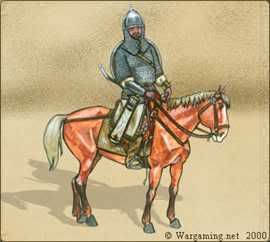
Hippotoxotai
The Hippotoxotai are the native Roman response to Persian, Saracen and Turkish horse archers, and are some of the most valuable troops amongst the Romanoi cavalry. They can be used to keep enemy horse archers from disturbing forming cavalry attacks, or they can lay aside their bows and confidently enter melee with their armored protection and strong melee weapons. These are versatile troops and a good commander will ensure many are at his disposal. Often an Emperor can more easily encourage the themes field these units rather than kataphraktoi - they are substantially cheaper, but no less useful.
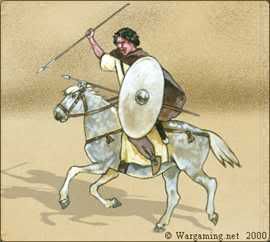
Trapazetai
The Trapazetai are a declining breed - acrobatic artists that according to legend can dodge or catch arrows in flight. While these legends might not be true, the Trapazetai are light cavalry troops of renown, capable of chasing down and destroying enemy horse archers with ease. Because of their speed and skill, they are also useful for following up a defeated foe. However, they have no armor and only light weapons - sending them against mailed cavalry or formed infantry would simply be foolish. Financially it seems possible that the themes should be able to field these troops in wide numbers, however the skills necessary to ride adeptly in the saddle and catch enemy horse archers are rare, and thus these units should be raised and maintained under the direct control of the state. They are simply too valuable to be wasted amongst the themes.
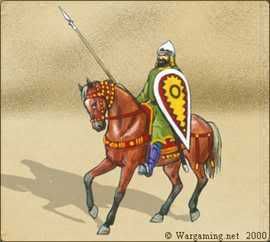
Themata Kontaratoi
The themes of the Empire do not necessarily provide the most reliable of soldiers - many of these are not professionals, but farmers thrust into the saddle by their local prince in times of war. Their standards of equipment vary widely based on which theme they came from - Alexios Komnenos of old was known to make sure his thematic troops were splendidly equipped, while the Paleologids of the Morea were known to cut costs by shoddily equipping their soldiers. Good thematic lancers can have a place in the cavalry line of an Emperor's army - bad lancers are often only useful for pursuing a defeated foe - they cannot even be trusted to scout. Rich themes such as Kappadokia or Thrake should be heavily discouraged from providing many of these types of troops during a general call-up. Unfortunately, for poor themes such as Varna, these varied units are sometimes the only option for answering the Empire's call.

Themata Hippeis
The simple 'horsemen' recruited from the themes are often just as unreliable as the Kontoratoi and even less effective. Armed with swords and light spears or javelins and little to no armor, these troops if disciplined can be used harass enemy infantry in the absence of missile troops. If they aren't disciplined, they are almost without use on the battlefield. If burdened with large numbers of ill-disciplined hippeis the best thing a general can do is hold them in reserve and throw them en masse at a wavering or retreating enemy. Sheer numbers can sometimes be as frightening to an opponent as a disciplined charge.
VILenin - Yes, that's where I got the inspiration for doing this little mini-update series. Byzantine Emperors often had a remarkable amount of free time - most held court basically from morning until only three or four in the afternoon, after which they were free to pursue their own interests. Some, like Constantine Porphyrogenitus, took to writing, others engaged freely and gleefully in theological debates, some gardened, some played polo, some trained with the army. I didn't think that someone regarded as a great general like Demetrios would go without writing something along these lines - or have someone ghost write it and slap his name on it to lend credibility.
Fulcrumvale - Yes, the Normans are devastatingly effective in battle, but at a series of huge downsides. They cause destruction to the lands around them through pillage, they do not respect the Byzantine throne or the Orthodox Church, and above all, they are ambitious. The author of the Strategikon views these downsides as outweighing whatever advantage can be gained by having them on the field.
RGB - The Byzantines have always been my favorite faction in both Medieval Total Wars, though with the new one I've had to get some mods and patches to change some of the most glaring things...
Estonianzulu - Yes, things are suddenly looking down for our heroes. Who lives and dies, who survives and thrives... well, I'll have the answers to that next week.
canonized - Glad you liked it. I'm doing these as a mini-series covering the army of Demetrios while I write and rewrite the next part of the story. Hope you like the rest!
=============================== ==========================

Imperial Cavalry

Hetaratoi
The Heteratoi form the Emperor's last line of defense, his shield when the sword of his army is broken. As such they should be the most carefully watched and maintained unit in all of Romanion. They also should never become too large - one thousand is a good number. Membership in the Hetaratoi is prestigious and should only go to the best, brightest, and bravest of the nobility as a training ground for both their skills in combat and their loyalty to the crown. As they are considered an elite unit, the Hetaratoi should always look the part - glazed armor and colorful cloaks and padded armor for their steeds should be in order. Ornate but useful masks as well. All of these reinforce the uniqueness of the unit to each member, making them proud to fight within it, and all the more resilient on the battlefield.

Klibanophroi
The Klibanophroi are the heaviest of the regular cavalry units, with both rider and mount covered in either chain or padded armor. A good klibanophroi will be equipped with a lance, mace, large kite shield, and the panoply of armor. As this equipment is expensive, all klibanophroi units should be raised by the state purse, and similarly maintained. The state should endeavor to keep as many of these units in the field as possible, as their charge is unstoppable by any known force. - Translator's Note - this is often used as evidence by many that the Strategikon was indeed written by Demetrios Megos, who was fond of heavy cavalry despite its slow speed

Kataphraktoi
Kataphraktoi has come to mean any of the cavalry units in Imperial service that wear heavy armor over the rider, if not the horse. These bear more in common with the Latin milites than with the kataphraktoi of old, whose tradition is best represented by the klibanophroi. These units are lighter and faster than the klibanophroi, but lack the heavier unit's ability to shatter formed infantry in a charge due to the lack of protection for the horse. Use them to batter and break up other cavalry formations, or as a heavy force to crush already wavering enemy infantry units. Maces, not swords should be the favorite melee weapon of these units - a mace need not pierce armor to cause harm to an opponent, an advantage when facing other armored cavalrymen. As many state resources will be devoted to the raising of klibanophroi, the state should encourage richer themes to raise and deploy their own kataphraktoi units. Some possible encouragement could be through positions at court, the promotion of their heirs to ranks in the Hetaratoi, or some kind of tax incentive.

Hippotoxotai
The Hippotoxotai are the native Roman response to Persian, Saracen and Turkish horse archers, and are some of the most valuable troops amongst the Romanoi cavalry. They can be used to keep enemy horse archers from disturbing forming cavalry attacks, or they can lay aside their bows and confidently enter melee with their armored protection and strong melee weapons. These are versatile troops and a good commander will ensure many are at his disposal. Often an Emperor can more easily encourage the themes field these units rather than kataphraktoi - they are substantially cheaper, but no less useful.

Trapazetai
The Trapazetai are a declining breed - acrobatic artists that according to legend can dodge or catch arrows in flight. While these legends might not be true, the Trapazetai are light cavalry troops of renown, capable of chasing down and destroying enemy horse archers with ease. Because of their speed and skill, they are also useful for following up a defeated foe. However, they have no armor and only light weapons - sending them against mailed cavalry or formed infantry would simply be foolish. Financially it seems possible that the themes should be able to field these troops in wide numbers, however the skills necessary to ride adeptly in the saddle and catch enemy horse archers are rare, and thus these units should be raised and maintained under the direct control of the state. They are simply too valuable to be wasted amongst the themes.

Themata Kontaratoi
The themes of the Empire do not necessarily provide the most reliable of soldiers - many of these are not professionals, but farmers thrust into the saddle by their local prince in times of war. Their standards of equipment vary widely based on which theme they came from - Alexios Komnenos of old was known to make sure his thematic troops were splendidly equipped, while the Paleologids of the Morea were known to cut costs by shoddily equipping their soldiers. Good thematic lancers can have a place in the cavalry line of an Emperor's army - bad lancers are often only useful for pursuing a defeated foe - they cannot even be trusted to scout. Rich themes such as Kappadokia or Thrake should be heavily discouraged from providing many of these types of troops during a general call-up. Unfortunately, for poor themes such as Varna, these varied units are sometimes the only option for answering the Empire's call.

Themata Hippeis
The simple 'horsemen' recruited from the themes are often just as unreliable as the Kontoratoi and even less effective. Armed with swords and light spears or javelins and little to no armor, these troops if disciplined can be used harass enemy infantry in the absence of missile troops. If they aren't disciplined, they are almost without use on the battlefield. If burdened with large numbers of ill-disciplined hippeis the best thing a general can do is hold them in reserve and throw them en masse at a wavering or retreating enemy. Sheer numbers can sometimes be as frightening to an opponent as a disciplined charge.
Last edited:
- 2
Interesting that the state maintains a large military by itself. Also, interesting that Demetrios or his ghostwriter certainly assigns fine gradations to his horsemen rather than sorting them into broad classes according to their role.
Also interesting that already by Demetrios' time the heavy cavalry adopted the kite shield, something used widely among the Normans but not very often among the Romans or the Turks. Demetrios (provided this is his work of course) was a very detailed military thinker, apparently, and I wonder how the Empire will do in his absence.
I suppose Infantry is next?
Also interesting that already by Demetrios' time the heavy cavalry adopted the kite shield, something used widely among the Normans but not very often among the Romans or the Turks. Demetrios (provided this is his work of course) was a very detailed military thinker, apparently, and I wonder how the Empire will do in his absence.
I suppose Infantry is next?
Last edited:
Yes, infantry is next, along with part of some of the theoretical concepts in Demetrian warfare. This is the last in the interim posts, before we return to the ongoing story. 
And yes, Demetrios or the ghostwriter go very in depth into the specific types of cavalry, as cavalry is seen in this army as the arm of decision on the battlefield. At both Mt. Tabor and Megiddo, the Roman army launched cavalry charges at decisive moments to try to break the enemy (the Norman charge at Tabor succeeded, the Emperor's successive charges at Megiddo did not). As cavalry is considered the army that actively breaks the enemy, the infantry is seen more as the arm of the army that holds the enemy in place so the cavalry can strike with maximum effect. Once again, the Varangoi and other units at Megiddo were meant to hold the Fatimid's attention while the Emperor prepared his counterattack, and at Mt. Tabor they held the Turks attention while the Normans formed for their decisive charge.
I'm intending to periodically do one of these as the story goes on... so that after major military changes and victories (or defeats) you can track how the Roman army develops.

The Mentalovoi are a remnant of the old Nikephoran armies used by the Bulgarontocus during his campaigns, and a direct descendant of the famous legionnaires. Armed with several heavy javelins, a shield, and a spatha, they form the melee counterpart to the heavy skoutatoi spearline. Unfortunately, due to fiscal mismanagement, these troops do not make up enough of the regular Imperial foot line in sufficient numbers, so many generals will find themselves using Varangoi or other expensive mercenary units to fill the Menalovoi's role. When used in battle, the Menalovoi should be stationed behind and on the flanks of the spear line. As the enemy approaches, the Menalovoi should throw their javelins to shake apart the enemy attack. After the enemy assault has broken on the walls of the Skoutatoi, the Menalovoi can be unleashed into the disorganized enemy, turning a setback into a rout.
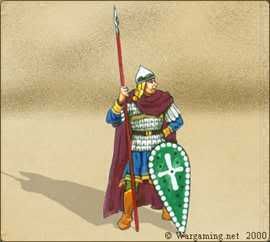
Skoutatoi
The Skoutatos is a stubborn fellow, as this must be his nature to serve on the spearline. On the battlefield, the skoutatoi must hold their ground and pin the enemy, occupying his attention for the horse to strike him from the flanks or rear. A wise ruler maintains enough equipment to make sure his skoutatoi go to battle with the proper panopoly. As the role of the skoutatoi is to hold the line while other forces, such as the Varangoi or the cavalry exploit enemy weaknesses, the skoutatoi must be well armored. Make sure spears, chain shirts and large shields are available for every skoutatos on campaign - armor makes men brave. Translator's Note - this is another piece of evidence often cited indicating that Demetrios himself wrote the treatise.
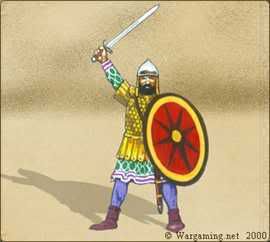
Thematikoi Spathariori
The Thematikoi Spathariori are the cheaper counterpart to the Menalovoi raised by the various themes across the Empire. Their armor depends on their parent theme but by regulation they must carry a spatha or equivalent length blade, as well as a large shield. In the absence of menalovoi or mercenary counterparts, use these troops to protect the flanks of a spearline, and plug gaps. WHen an enemy has tired themselves against the spears, you can counterattack with them - but do not expect the same devastating results the Menalovoi guarantees.
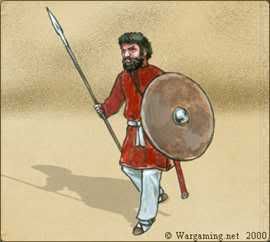
Thematikoi Kontaratoi (foot)
The foot Thematikoi Kontaratoi suffer many of the same problems as their mounted counterparts, yet in a spearline problems of bad discipline and low morale are severe. Unfortunately, the majority of thematic infantry supplied to an Emperor during a call-up falls within this category. Lightly armored, relying on their shields for most of their protection, the thematikoi kontaratoi should not be used in the major, frontline field armies within an Emperor's service. They will waver under attack, and if pressed too hard they will break. A wise Emperor will ensure that his themes are fiscally able to equip these troops well, so that when they do enter service, they are servicable in the line of battle.
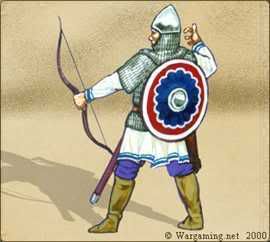
Toxotai
Toxotai is the general term I will use to cover all forms of archers, slingers and other long range missile troops available to an Emperor. Often the best place for these troops is behind the skoutatoi spearline - where they can use their longer ranged bows to keep enemy missile cavalry away, and keep enemy missile troops honest. Behind the skoutatoi all toxotai can also freely fire at the enemy as he advances and as he retreats, keeping a constant hail of arrows on their positions. Some of the toxotai, such as those raised within Byzantion or Konstantinopolis itself, are heavily armored and armed with spathas in their own right, and can judiciously be used as frontline infantry. However, a wise general would avoid this unless it is absolutely necessary.
A new form of Toxotai has arisen in the Franklish lands that bears mention. A weapon, called a crossbow, has much potential use within Romanion. Simply built and easy to use, it gives its wielder the ability to launch a powerful bolt with enough force to pierce heavy armor. Unfortunately, these are also direct fire weapons, which would necessitate exposing so-armed toxotai to the enemy by stationing them in front of the skoutatoi spearline. Future Emperors should examine equipping some toxotai units with these weapons.
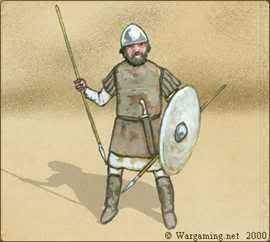
Peltastai
The Peltastai are another remnant of a much older, more venerable army. These troops are in the decline, and a wise general would seek better armed and armored substitutes to fill their role. Toxotai in general will have longer range that peltasts armed with javelins, while Menalovoi will be better equipped for close combat. Nonetheless, if themes send these soldiers as their contribution, one should place them in front of the spearline, order them to fire their javelins, and should the enemy come to close, retreat behind the skoutatoi. Various incentives should be offered to the themes to discourage them from providing this class of soldier.
Army Composition & Tactics, Part One
The ideal Emperor will realize there are several armies within the Empire, and prepare accordingly. Firstly, there is the state army, often raised from within the Imperial desmense. As an Emperor can directly and surely control his desmense finances, he should endeavor to ensure that these troops are the best trained and equipped within the whole of the Empire. Menalovoi and Skoutatoi should dominate the infantry of these formations, while Hippotoxotai and Klibanophroi should dominate the cavalry. These forces should form the core of every major army unit deployed by the Empire.
Secondly, there are the armies raised by the themes within the Empire, who can field varying kinds of troops. The themes across the Danube will be heavy on Trapezatai, Hippotoxotai and Pechenegs, while those of Achaea and Greece will be dominated by Thematikoi KOntoratai and the like. An Emperor must carefully weigh which themes' soldiers will deploy where, to ensure each field army has a balance of training, quality and type of soldier...
And yes, Demetrios or the ghostwriter go very in depth into the specific types of cavalry, as cavalry is seen in this army as the arm of decision on the battlefield. At both Mt. Tabor and Megiddo, the Roman army launched cavalry charges at decisive moments to try to break the enemy (the Norman charge at Tabor succeeded, the Emperor's successive charges at Megiddo did not). As cavalry is considered the army that actively breaks the enemy, the infantry is seen more as the arm of the army that holds the enemy in place so the cavalry can strike with maximum effect. Once again, the Varangoi and other units at Megiddo were meant to hold the Fatimid's attention while the Emperor prepared his counterattack, and at Mt. Tabor they held the Turks attention while the Normans formed for their decisive charge.
I'm intending to periodically do one of these as the story goes on... so that after major military changes and victories (or defeats) you can track how the Roman army develops.

Imperial Infantry
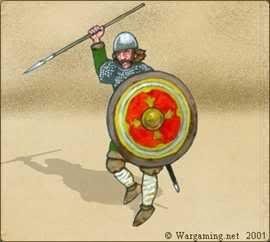
Menalovoi

Menalovoi
The Mentalovoi are a remnant of the old Nikephoran armies used by the Bulgarontocus during his campaigns, and a direct descendant of the famous legionnaires. Armed with several heavy javelins, a shield, and a spatha, they form the melee counterpart to the heavy skoutatoi spearline. Unfortunately, due to fiscal mismanagement, these troops do not make up enough of the regular Imperial foot line in sufficient numbers, so many generals will find themselves using Varangoi or other expensive mercenary units to fill the Menalovoi's role. When used in battle, the Menalovoi should be stationed behind and on the flanks of the spear line. As the enemy approaches, the Menalovoi should throw their javelins to shake apart the enemy attack. After the enemy assault has broken on the walls of the Skoutatoi, the Menalovoi can be unleashed into the disorganized enemy, turning a setback into a rout.

Skoutatoi
The Skoutatos is a stubborn fellow, as this must be his nature to serve on the spearline. On the battlefield, the skoutatoi must hold their ground and pin the enemy, occupying his attention for the horse to strike him from the flanks or rear. A wise ruler maintains enough equipment to make sure his skoutatoi go to battle with the proper panopoly. As the role of the skoutatoi is to hold the line while other forces, such as the Varangoi or the cavalry exploit enemy weaknesses, the skoutatoi must be well armored. Make sure spears, chain shirts and large shields are available for every skoutatos on campaign - armor makes men brave. Translator's Note - this is another piece of evidence often cited indicating that Demetrios himself wrote the treatise.

Thematikoi Spathariori
The Thematikoi Spathariori are the cheaper counterpart to the Menalovoi raised by the various themes across the Empire. Their armor depends on their parent theme but by regulation they must carry a spatha or equivalent length blade, as well as a large shield. In the absence of menalovoi or mercenary counterparts, use these troops to protect the flanks of a spearline, and plug gaps. WHen an enemy has tired themselves against the spears, you can counterattack with them - but do not expect the same devastating results the Menalovoi guarantees.

Thematikoi Kontaratoi (foot)
The foot Thematikoi Kontaratoi suffer many of the same problems as their mounted counterparts, yet in a spearline problems of bad discipline and low morale are severe. Unfortunately, the majority of thematic infantry supplied to an Emperor during a call-up falls within this category. Lightly armored, relying on their shields for most of their protection, the thematikoi kontaratoi should not be used in the major, frontline field armies within an Emperor's service. They will waver under attack, and if pressed too hard they will break. A wise Emperor will ensure that his themes are fiscally able to equip these troops well, so that when they do enter service, they are servicable in the line of battle.

Toxotai
Toxotai is the general term I will use to cover all forms of archers, slingers and other long range missile troops available to an Emperor. Often the best place for these troops is behind the skoutatoi spearline - where they can use their longer ranged bows to keep enemy missile cavalry away, and keep enemy missile troops honest. Behind the skoutatoi all toxotai can also freely fire at the enemy as he advances and as he retreats, keeping a constant hail of arrows on their positions. Some of the toxotai, such as those raised within Byzantion or Konstantinopolis itself, are heavily armored and armed with spathas in their own right, and can judiciously be used as frontline infantry. However, a wise general would avoid this unless it is absolutely necessary.
A new form of Toxotai has arisen in the Franklish lands that bears mention. A weapon, called a crossbow, has much potential use within Romanion. Simply built and easy to use, it gives its wielder the ability to launch a powerful bolt with enough force to pierce heavy armor. Unfortunately, these are also direct fire weapons, which would necessitate exposing so-armed toxotai to the enemy by stationing them in front of the skoutatoi spearline. Future Emperors should examine equipping some toxotai units with these weapons.

Peltastai
The Peltastai are another remnant of a much older, more venerable army. These troops are in the decline, and a wise general would seek better armed and armored substitutes to fill their role. Toxotai in general will have longer range that peltasts armed with javelins, while Menalovoi will be better equipped for close combat. Nonetheless, if themes send these soldiers as their contribution, one should place them in front of the spearline, order them to fire their javelins, and should the enemy come to close, retreat behind the skoutatoi. Various incentives should be offered to the themes to discourage them from providing this class of soldier.
Army Composition & Tactics, Part One
The ideal Emperor will realize there are several armies within the Empire, and prepare accordingly. Firstly, there is the state army, often raised from within the Imperial desmense. As an Emperor can directly and surely control his desmense finances, he should endeavor to ensure that these troops are the best trained and equipped within the whole of the Empire. Menalovoi and Skoutatoi should dominate the infantry of these formations, while Hippotoxotai and Klibanophroi should dominate the cavalry. These forces should form the core of every major army unit deployed by the Empire.
Secondly, there are the armies raised by the themes within the Empire, who can field varying kinds of troops. The themes across the Danube will be heavy on Trapezatai, Hippotoxotai and Pechenegs, while those of Achaea and Greece will be dominated by Thematikoi KOntoratai and the like. An Emperor must carefully weigh which themes' soldiers will deploy where, to ensure each field army has a balance of training, quality and type of soldier...
Last edited:
- 2
As my last post indicates I had hoped for a story update but this is damn brilliant as well. A really nice insight into the Roman army. 
BUT NOW I WANT TO KNOW WHAT HAPPENED TO DEMETRIOS AND MICHAEL!!!!
~Lord Valentine~
BUT NOW I WANT TO KNOW WHAT HAPPENED TO DEMETRIOS AND MICHAEL!!!!
~Lord Valentine~
I am with Lord Valentine! You have certainly mastered the art of the cliffhanger!
These last few posts have been great fun though, very detailed.
These last few posts have been great fun though, very detailed.
Very nice dissertation on imperial infantry, I really enjoyed reading about the different types utilized on campaign. and I continue to enjoy your AAR, General_BT! 
Where did you get the information to write all that? I can’t imagine that it came from wikipedia…
- 1
Fulcrumvale - Quite a bit of it came from wikipedia - they have an excellent series of articles on the Byzantine Army if you're interested, especially the Comnenid army. Some of it also came from my background as a military history graduate student - while my main field of study is Russian history, I have a side interest in Byzantium that borders on obsessiveness.  Also, some of the various games (and my tactics within them) like both Medieval Total Wars influenced the ideas. Finally, I made quite a bit of it up based on the events so far in the AAR - the Roman reliance on heavy cavalry as the deciding arm, for example.
Also, some of the various games (and my tactics within them) like both Medieval Total Wars influenced the ideas. Finally, I made quite a bit of it up based on the events so far in the AAR - the Roman reliance on heavy cavalry as the deciding arm, for example.
Mettermck - Glad you enjoyed it! I thought it'd be a nice interlude before we go back to the nitty-gritty of Byzantine politics.
Alfred Packer - Good to see you posting again! I can only hope the next installment (should be up tonight) will live up to its predecessors!
Lord Valentine - I've been very mean, I know. Rest assured, the time has been spent planning and thinking about how the next post will play out, and it will be well worth the wait.
Mettermck - Glad you enjoyed it! I thought it'd be a nice interlude before we go back to the nitty-gritty of Byzantine politics.
Alfred Packer - Good to see you posting again! I can only hope the next installment (should be up tonight) will live up to its predecessors!
Lord Valentine - I've been very mean, I know. Rest assured, the time has been spent planning and thinking about how the next post will play out, and it will be well worth the wait.

Immediately the plaza exploded into chaos.
One second, Nikolaios could see two men, one headed towards the Basilieus, the other towards Michael, daggers drawn. There was a flash of knives, before a storm of swords burst as stunned guardsmen finally reacted, storming into the fray. Nikolaios felt Ioannis' stronger hands grabbing him and shoving him away from the tumult, and the last he saw of his friend was Ioannis drawing his blade and charging towards the Emperor. He heard Isaakios Thrakesios' voice above the din - "Secure the Sebastokrator!" Hands lifted Nikolaios up, and suddenly he was surrounded by a sea of soldiers, pressed tight, pushing through the screaming crowd. He tried to turn, tried to see what had happened. He couldn't hear the clash of blades even above the shouts of all around.
"What is going on!?" Nikolaios cried to someone, anyone, only to hear the cries of chaos all about him.
The guards did not break away from him even as they rushed into the Great Palace, its almost finished interior now filled with servants rushing about. He could hear calls demanding for chirugeons, shouts for order, and above it all Strategos Thrakesios barking for people to move out of the way or face his blade. Nikolaios shouted again, and finally the elder Thrakesios broke through the circle of soldiers.
"There's been an attempt on your father's life," Isaakios said unnecessarily, "we're taking you to the Octagon throne room for your own safety! The Varangoi and Kappadokia regiments are already there, you'll have a thousand bodyguards around your person!"
"What happened to Ioannis! Where is my father! Where is my mother!" A thousand questions tumbled from Nikolaios' mouth. Thrakesios' lips were locked in grim silence, as the cluster of soldiers pressed onwards.
Finally the storm of steel broke in the Octagon, the great throne room normally used by Emperors for great state occasions. Thrakesios promptly left, leaving Nikolaios alone in a sea of armored guardsmen. Amidst its splendid tapestries and artwork, all renovated and restored under Demetrios, Nikolaios felt tiny and alone. To reinforce the point, the fresh and new banners of Demetrios' victories over his foes hung above Nikolaios' head like some sword of Damocles. All the walls of the room were lined with grim looking Varangians and Kappadokian guardsmen, their weapons at ready, their eyes constantly looking about, checking every window, crevice and tapestry for assassins.
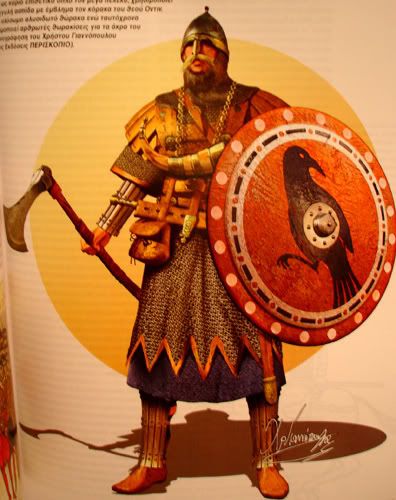
One of the Varangian guardsmen who were set up to keep guard over Nikolaios after the assassination attempt
It seemed like an eternity before the doors to the hall opened, and both Thrakesios and his son entered the room, grim looks on their faces. Nikolaios noticed that Ioannis' sword was out of its scabbard, half its length caked with the crusty brown of dried blood. The younger Thrakesios' face was full of worry, while the elder's face was dark with fury.
"What happened? Where is my father? Where.." Nikolaios charged towards them.
"Your mother is fine," the Strategos stopped and bowed, "she is currently in her quarters, also secured. Your father and Michael were attacked by two men we have determined were likely part of the hashashin..." Nikolaios guessed the blood on Ioannis' sword belonged to at least one of the assassins.
"Nik," Ioannis raised a hand, and stopped his father from talking. The elder Thrakesios chewed his lips with unspent anger at the vile curs who had done this, but stopped talking to let his son speak. "The blades were covered with a poison, the chirugeons have not discovered which," Ioannis said gently. "Their wounds are severe, and the poisons are only making matters worse."
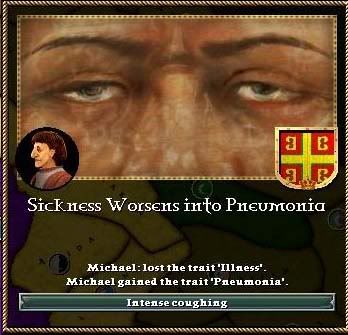
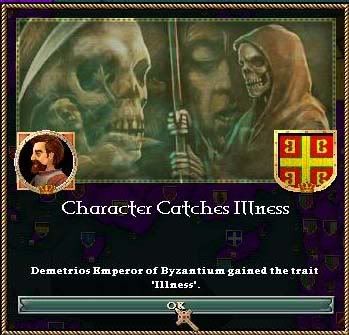
Both the Basilieus and Michael were adversely affected by the poison on the assassin's blade
"Well, have they tried anything?!" Nikolaios snapped.
"Mithradatium, hemlock, they are still trying..." Ioannis said gently. "The results are in doubt, Nik..." Nikolaios felt his friend's hand come to his shoulder, and with that touch, there was an immediate change.
Within the sea of turbulent emotions, a moment of clarity rose in Nikolaios' mind. If Michael and Demetrios died, the Imperial throne would be up for grabs. Demetrios had named no Kaisar, and chaos and ruin would be the result. Second, his mother's words stuck into his mind. Her reminder for him to observe protocol could be seen as suspicious... he needed to act quickly. He stood in place, closed his eyes, calming himself, pushing his fear, his anger, his own concerns aside. The Greeks did not believe logic could be exercised in moments of passion, and he focused himself by reciting in his mind as much literature as possible. It seemed like an eternity, but he felt his pulse slowing, his breathing becoming normal, and he opened his eyes.
"Strategos," he said quietly, his voice gaining momentum as he spoke, "I want the army to use its power to declare me Kaisar until the situation with my father is resolved."
"Highness?" Thrakesios asked uneasily. "You are but thirteen, there will be..."
"I am also the son of Demetrios Megos, and I have no doubt you will be able to bring the army to my side," Nikolaios said simply, walking towards the commander. "The army has always taken as its duty the role of making sure the Imperial throne is in strong and secure hands. Now I ask you to perform that role. It will only be temporary, until the health of my brother and father are restored."
"Hi..." Thrakesios started to protest, before the Prince narrowed his eyes.
Shakily, the foremost Strategos in the Empire came to attention.
"Inform the Imperial Council members they are to meet here in one hour, but do not tell them who calls the meeting," Nikolaios added. Leaving that tidbit out would keep them off balance until they arrived. The Crown Prince had no idea who had ordered the assassination, but clearly they had fingers deep into the city bureaucracy. He would need that hour to plan, he couldn't afford to have the others doing the same.
"Yes, Highness."
Survival was the goal in Romanoi politics, and the years of training, of information his mother had impressed into him from a young age were now at work. Nikolaios' mind worked quickly, drawing up lists of people he knew might want to do this, of people who might be forced into doing this, and people who likely knew nothing about the whole affair.
Of the council, it was obviously apparent Isaakios Thrakesios, despite his position as the preeminent general of the Empire and the wide respect he held within the army, had nothing to do with the attack. He and Demetrios were personal friends, and he would have had little to gain from trying to take the throne. Additionally, if he had really wanted the throne, why had he not already killed Nikolaios when he had the Crown Prince within his power?
Then there was the Logothetes Theophano... she had long been a source of stability in the government. She was childless with few relatives, and her husband was old and decrepit. In short, she posed no potential threat either. Neither did the Megos Domestikos - Kamal Qasim was a Saracen by blood even if he was an Christian by baptism, which meant he was highly reliant on the Emperor.
The Megas Doux was a potential problem. Lord Kaukadenos had ensured the rise of Demetrios Komnenos to the throne and revealed the conspiracy by Nikolaios' great uncle - he'd thus shown himself capable of duplicity. He was the first on the suspect list so far. Nikolaios carefully thought about the remaining members of the Council, and one by one he grew convinced they had no reason to order an attack on his father.
Finally Nikolaios arrived at the last person in the Council - his own mother. While they were on campaign, she'd amassed a great deal of power, being both the Logothetes in charge of finances, and the logothetes in charge of intelligence. The first thing Hajnal taught her son was that too much power in the hands of anyone was dangerous - and Nikolaios resolved as a display of his authority, and a public act to signal he was his own man, he would take intelligence responsibilities from his mother and place them in the hands of Isaakios Thrakesios. The strategos was respected, and had no formal position on the Council - if possible, he wanted Thrakesios somehow involved in the inevitable Regency. This would formalize his presence - and Nikolaios wanted to have at least one other person on the Council aside from his mother that he could trust. He knew she detested his father, but he could not imagine her ordering something so heinous as this.
When the doors to the Octagonal room opened an hour later, Nikolaios was ready.
======================================================================
"How is my father?" a tired and weary Nikolaios asked some three hours later. The last angry footfalls of Lord Kaukadenos could be heard in the hallway outside the Octagon as the great doors slowly closed. Within the chamber, Nikolaios was alone with Ioannis, save the enormous bevy of guards that stood around.
"He is asleep," Ioannis whispered quietly. "They found the poison - it was a combination of wolfbane and a liquid found from the wastes of castor oil." Nikolaios could tell by the slight tremble in his friend's voice something was wrong.
"What else?"
"How did the meeting go?" Ioannis shifted the subject. Nikolaios grimaced.
"Theopano Byrennios and your father will act as joint Regents, with my consultation," Nikolaios sighed, "their power lasting so long as the Basilieus remains incapacitated." Nikolaios had been pleased that he'd gotten Thrakesios to take the position - with his support of the arrangement, that guaranteed the army would support the arrangement. It avoided any resemblance of favoritism towards Hajnal, and put loyal people in charge, and with the army's backing, the nobility might grumble, but they could do little. "Mother wailed and screamed at me when she found the army had declared me Kaisar and that I was stripping her of one of her positions. She positively begged me not to hand the intelligence logothetes to anyone else - to the point she offered to surrender her fiscal post," Nikolaios frowned, worrying over what his friend was hiding from him. "Kaukadenos accused me of plotting a coup, and I had to restrain your father from striking him."
"Father is understandably upset by this," Ioannis whispered quietly. "Why do you think your mother didn't want to give up her logothetes spot?" Ioannis asked, further avoiding telling Nikolaios what bothered him.
"I have no idea," Nikolaios said, glancing towards the window. The sun was setting on this long, hard day, and the Crown Prince could feel the reserve, the strength he'd built up to get through the meeting, to get through the politics, start to break down. "I couldn't approve of her keeping the position - she's too skilled at running Imperial finances, and she couldn't have two posts. Theophano and your father agreed, and once that happened, my mother's face went ashen," Nikolaios restrained himself even more... he knew he couldn't hold for long when a single tear started down his face.
"Nik?" Ioannis started to hug his friend, and finally all of Nikolaios' reserve, will and mental strength broke down. He slowly sank to the floor, sobbing into hisfriends arms - frightened for himself, and for the future. For the time being, Nikolaios didn't care what the news was that Ioannis had held from him, or what happened in the labyrinth of Romanoi politics - he was nothing more than a scared little boy, forced to grow up before his time.
Neither Nikolaios nor Ioannis heard the door to the chamber crack open, and neither saw the elder Thrakesios peek into the room. The Strategos had a momentary delay in his decision, before he let the door quietly shut again. Now was not the time to tell the Crown Prince that Michael was no more.
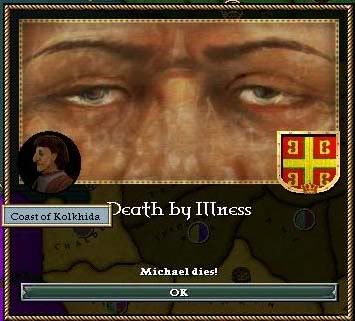
Michael Komnenos, 1186-1105
=============================== ==========================
Thus ends the life of perhaps one of the more worthy Komnenids who never saw the throne.
For those more interested in the wider world, here are two images to satisfy your curiosity.
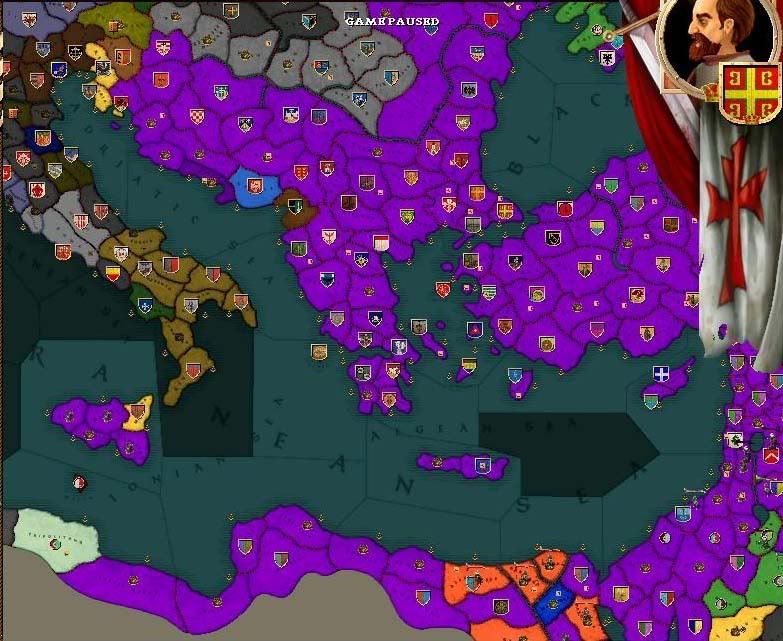
The first shows the state of Romanion after the Cyrenaican and First Seljuk Wars. The Anatolian and trans-Danube borders are cut off, as there was no change. However, Romanion has made significant inroads into Egypt, despite the Norman presence, and controls all of the Levant.
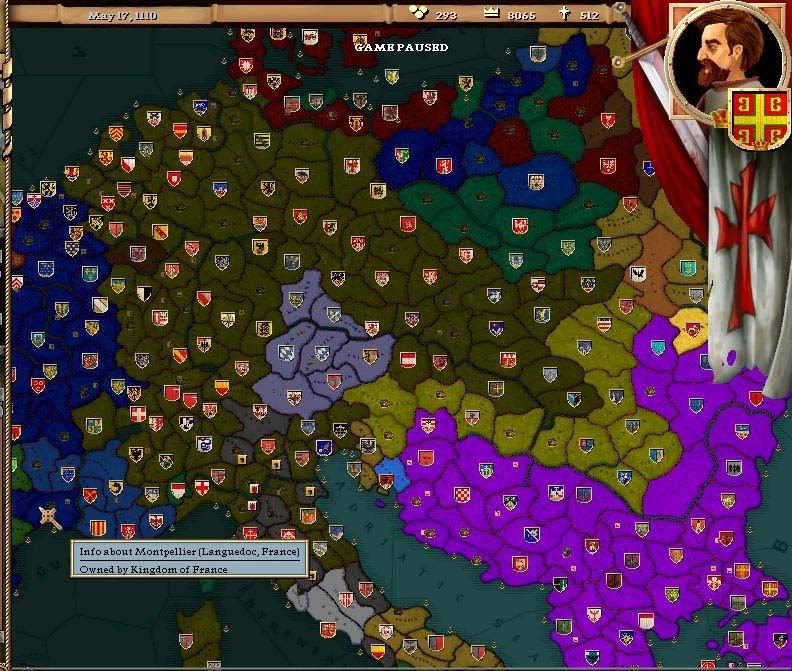
The second shows what Romanion will shortly have to contend with...
Last edited:
- 2
An excellent chapter and the intrigue that went on was masterfully crafted . The internal operations of going through the list of possible political enemies was well done . This is the hallmark of the Roman Empire in its later stages - the Byzantine craft . It was well represented here .
Poor Michael!
But no, nothing is for certain yet. Still things to overcome and hard truths to swallow.
You said you weren't strong. That's a pretty strong Romaion, you know. If you manage to keep this all together until the Germans fall apart things will be well enough from here on.
But no, nothing is for certain yet. Still things to overcome and hard truths to swallow.
You said you weren't strong. That's a pretty strong Romaion, you know. If you manage to keep this all together until the Germans fall apart things will be well enough from here on.
I must say I pity Michael! I am hoping for a recovery of Demetrios and a revenge vendetta that would make "Titus Andronikus" look like a mere children's play. 
Anyway an excellent update. You have managed to keep the suspense alive all the way.
~Lord Valentine~
Anyway an excellent update. You have managed to keep the suspense alive all the way.
~Lord Valentine~
Man, that was terrible seeing Michael pass that way. Poor Nik, how is he going to react when he learns of his mother's involvment in the plot?
Excellent update!
Excellent update!
You've done quite well, or perhaps I should say your Emperors have, in rebuidling the Eastern Roman Empire. I say wait for the Germans to collapse and then head into Italy.
And a great story update, the feeling is very much of things hanging in the balance, with either a rocky regency ahead or Demetrios recovering and looking for vengeance.
And a great story update, the feeling is very much of things hanging in the balance, with either a rocky regency ahead or Demetrios recovering and looking for vengeance.

